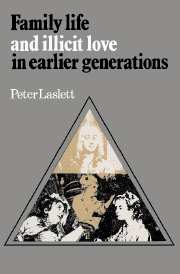Book contents
- Frontmatter
- Contents
- Introduction: the necessity of a historical sociology
- 1 Characteristics of the Western family considered over time
- 2 Clayworth and Cogenhoe
- 3 Long-term trends in bastardy in England
- 4 Parental deprivation in the past: a note on orphans and stepparenthood in English history
- 5 The history of aging and the aged
- 6 Age at sexual maturity in Europe since the Middle Ages
- 7 Household and family on the slave plantations of the U.S.A.
- Bibliography
- Index
3 - Long-term trends in bastardy in England
Published online by Cambridge University Press: 12 September 2009
- Frontmatter
- Contents
- Introduction: the necessity of a historical sociology
- 1 Characteristics of the Western family considered over time
- 2 Clayworth and Cogenhoe
- 3 Long-term trends in bastardy in England
- 4 Parental deprivation in the past: a note on orphans and stepparenthood in English history
- 5 The history of aging and the aged
- 6 Age at sexual maturity in Europe since the Middle Ages
- 7 Household and family on the slave plantations of the U.S.A.
- Bibliography
- Index
Summary
In the study of family life, as with all other consistencies of behaviour, the irregularities count for a very great deal to the observer, more in fact than they do to the membership of the society concerned. This is particularly true of historical sociology. We can only get to know about the effectiveness or often even the existence of a rule from the records of what happened when this rule was breached. We certainly have to rely to a very large extent on the documents which were written about such unwonted events for our knowledge of the framework of family life, and of the quality of the experience of those who lived within it.
Ordinary, modest, conscientious men and women did not spend much of their time describing for the benefit of posterity the ordinary conventions which they lived by and their everyday relationships with their children or their servants. Least of all were they disposed to record their sexual relationships with their spouses, or their spouses-to-be. Only if something outrageous happened, if a son started to steal or a daughter to take up magical rites, and above all if a servant girl produced a bastard child, was it likely that expression would be given to the conventions and regulations which should have been obeyed. When these things happened, there would certainly be considerable discussion of the facts, or alleged facts, and sometimes a written record made.
- Type
- Chapter
- Information
- Family Life and Illicit Love in Earlier GenerationsEssays in Historical Sociology, pp. 103 - 159Publisher: Cambridge University PressPrint publication year: 1977
- 1
- Cited by



